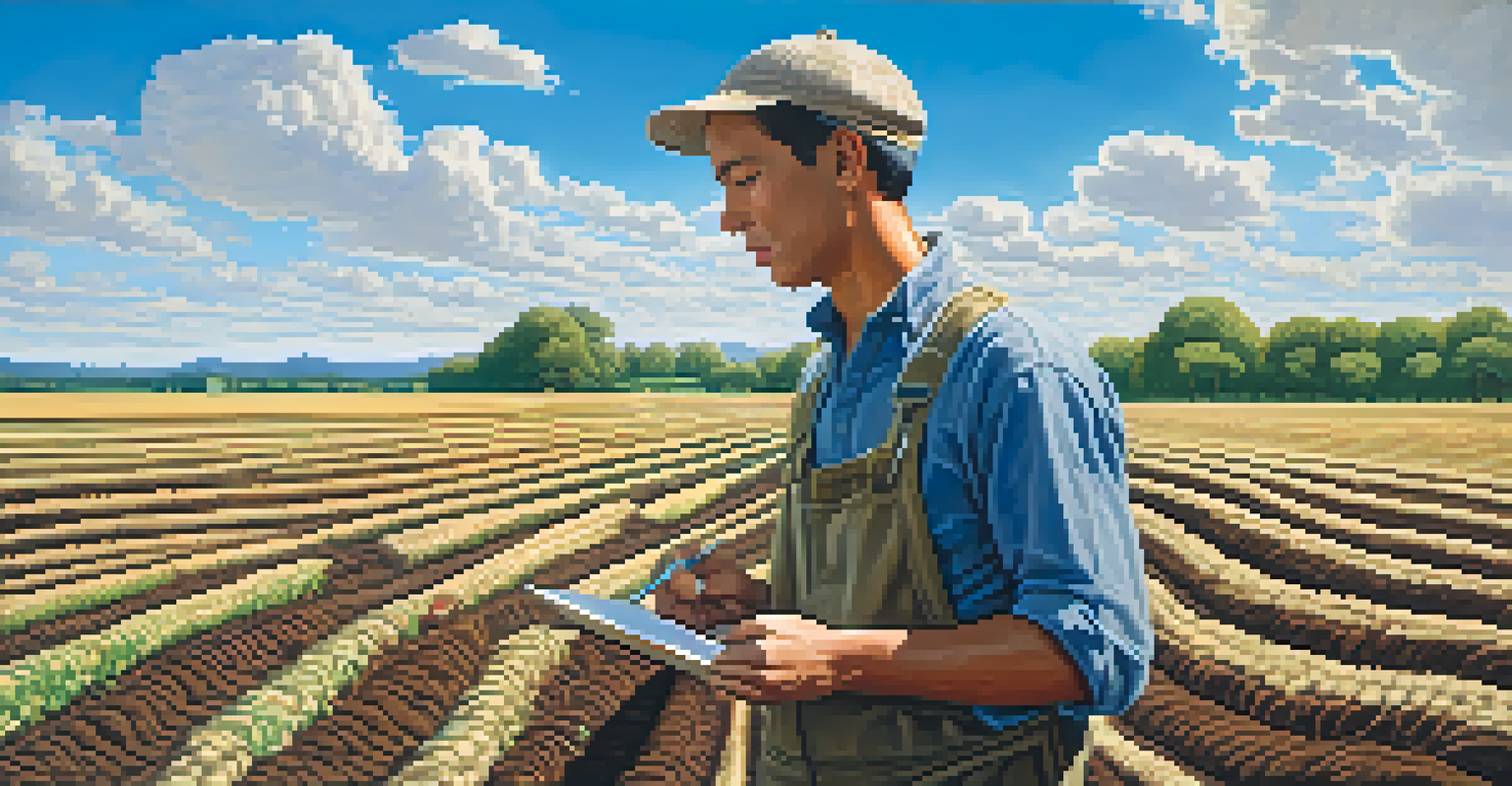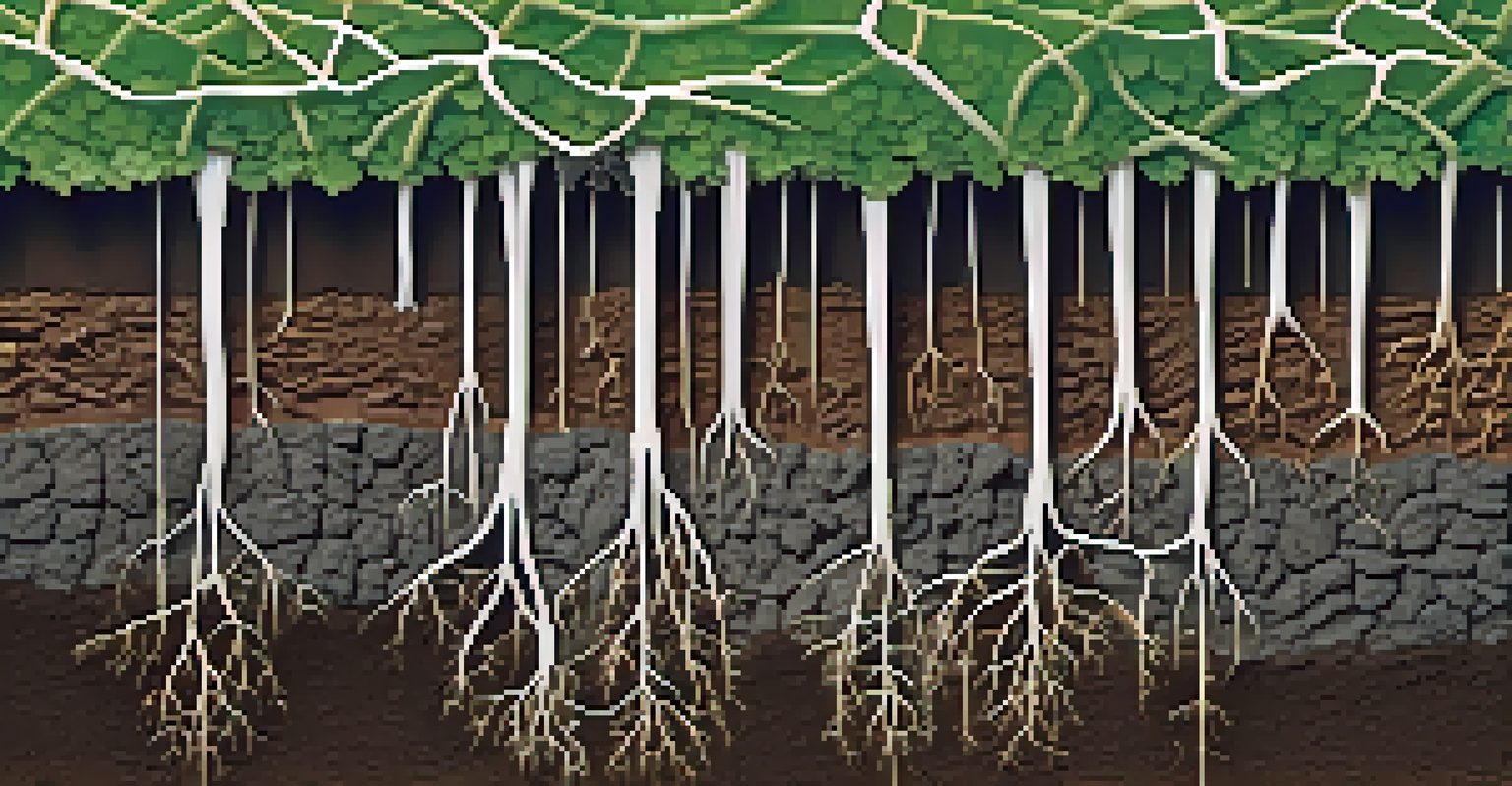Mycorrhizal Fungi: Key Players in Sustainable Agriculture

Understanding Mycorrhizal Fungi and Their Role
Mycorrhizal fungi are fascinating organisms that form symbiotic relationships with plant roots. This partnership is crucial for nutrient exchange, allowing plants to access essential minerals and water from the soil. In return, the fungi receive carbohydrates produced by the plants through photosynthesis. This mutualistic relationship enhances plant health and growth, making mycorrhizal fungi key players in agriculture.
The soil is a living organism, and mycorrhizal fungi are its heart, connecting plants to their nutrition and ensuring their survival.
These fungi come in different types, with the most common being arbuscular mycorrhizal fungi (AMF) and ectomycorrhizal fungi. AMF penetrate plant roots and provide a direct nutrient exchange, while ectomycorrhizal fungi form a sheath around the roots. Both types improve soil structure and fertility, promoting sustainable farming practices.
By improving nutrient uptake and soil health, mycorrhizal fungi play a vital role in reducing the need for chemical fertilizers. This not only lowers farming costs but also minimizes environmental impact, making these fungi essential allies in the quest for sustainable agriculture.
Benefits of Mycorrhizal Fungi in Agriculture
The benefits of mycorrhizal fungi extend beyond nutrient absorption. They enhance soil structure by creating networks of hyphae that bind soil particles together, improving aeration and water retention. This leads to healthier plant growth and resilience against drought, which is increasingly important in the context of climate change.

Moreover, mycorrhizal fungi can help plants fend off diseases by promoting a robust root system and enhancing the plant's immune response. This natural disease resistance reduces the need for chemical pesticides, contributing to more sustainable farming practices that are safer for both the environment and consumers.
Mycorrhizal Fungi Boost Plant Growth
These fungi enhance nutrient uptake and soil health, making them essential for sustainable agriculture.
Farmers who incorporate mycorrhizal fungi into their agricultural practices often report increased crop yields and improved soil health. This presents a win-win scenario where productivity rises while environmental impact decreases, showcasing the fungi's significant role in modern agriculture.
Mycorrhizal Fungi and Soil Health
Healthy soil is the foundation of sustainable agriculture, and mycorrhizal fungi are fundamental to maintaining this health. They contribute to the formation of soil aggregates, which improve soil structure and encourage beneficial microbial activity. This vibrant ecosystem within the soil is essential for nutrient cycling and overall fertility.
Mycorrhizal fungi are nature's hidden powerhouses that play an essential role in supporting plant health and sustainable farming.
In addition, mycorrhizal fungi help to sequester carbon in the soil, playing a role in climate change mitigation. By promoting carbon storage, these fungi not only enhance soil health but also contribute to efforts aimed at reducing greenhouse gas emissions.
The presence of mycorrhizal fungi in soil can also help prevent erosion by stabilizing soil particles. This is particularly important in agricultural areas where soil erosion can lead to loss of topsoil and reduced productivity, highlighting the fungi's critical role in soil conservation.
Integrating Mycorrhizal Fungi into Farming Practices
Integrating mycorrhizal fungi into farming practices can be achieved through various methods. One effective approach is the use of mycorrhizal inoculants, which can be applied during planting to enhance root colonization. These inoculants are available in various forms, such as powders or granules, making it easy for farmers to use them.
Crop rotation and cover cropping are also strategies that can promote mycorrhizal fungi development. By planting diverse crops and cover crops, farmers can create a more conducive environment for these fungi, which thrive in diverse ecosystems. This not only supports the fungi but also enhances overall soil health.
Improved Soil Health and Structure
Mycorrhizal fungi contribute to better soil structure and fertility, promoting healthier plant growth and resilience.
It's essential for farmers to understand the specific needs of their crops and soil types to maximize the benefits of mycorrhizal fungi. By tailoring their approaches, they can boost crop resilience and productivity, paving the way for more sustainable agricultural practices.
Challenges in Using Mycorrhizal Fungi
While the benefits of mycorrhizal fungi are clear, there are challenges in their use. One major hurdle is the variability in fungal effectiveness depending on soil type and environmental conditions. This means that not all mycorrhizal fungi will thrive in every setting, making it crucial for farmers to conduct soil assessments before application.
Additionally, the presence of certain agricultural practices, such as excessive tillage and the use of chemical fertilizers, can disrupt mycorrhizal networks. These practices can negatively impact the delicate balance of the soil ecosystem, hindering the fungi's ability to support plant health.
To overcome these challenges, education and research are vital. Farmers need access to information on the best practices for integrating mycorrhizal fungi into their operations, as well as ongoing support from agricultural experts to ensure successful implementation.
Research and Innovations in Mycorrhizal Fungi
Research on mycorrhizal fungi is expanding, revealing more about their potential in sustainable agriculture. Scientists are investigating the genetic diversity of these fungi to better understand how different strains interact with various crops and soil types. This research could lead to tailored solutions that optimize the benefits of mycorrhizal fungi for specific agricultural needs.
Innovations in biotechnology are also paving the way for enhanced mycorrhizal applications. New techniques in fungal cultivation and inoculation methods are being developed to improve the efficiency of mycorrhizal fungi in agricultural systems. These advancements may help overcome some of the challenges related to fungal effectiveness in diverse environments.
Integration Challenges for Farmers
Farmers face challenges in effectively utilizing mycorrhizal fungi due to soil variability and disruptive agricultural practices.
The growing interest in sustainable practices is driving funding and support for research in this area. As more farmers recognize the value of mycorrhizal fungi, the push for innovation will likely lead to breakthroughs that can transform agricultural practices worldwide.
The Future of Mycorrhizal Fungi in Agriculture
Looking ahead, the future of mycorrhizal fungi in agriculture appears promising. With increasing awareness of sustainable farming practices and the need to reduce chemical inputs, mycorrhizal fungi are gaining recognition as valuable allies. Their ability to enhance nutrient uptake and improve soil health aligns perfectly with the goals of modern agriculture.
As more farmers adopt regenerative practices that prioritize soil health, the role of mycorrhizal fungi will only grow. This shift towards sustainability could lead to a greater reliance on these fungi, ultimately benefiting global food security and environmental health.

Collaboration between farmers, researchers, and policymakers will be crucial in harnessing the full potential of mycorrhizal fungi. By working together, we can create a sustainable agricultural landscape that not only meets the needs of today but also preserves resources for future generations.